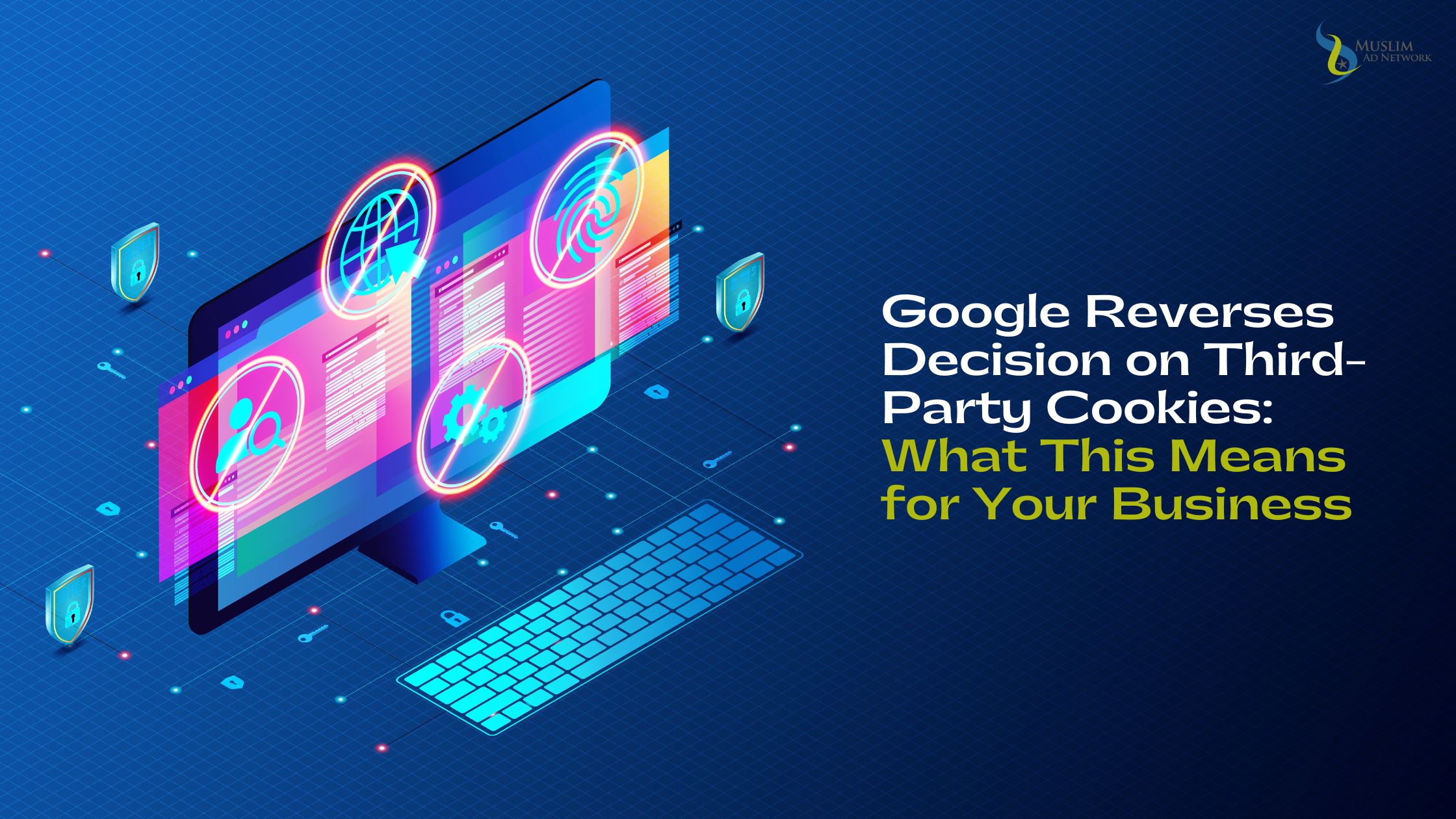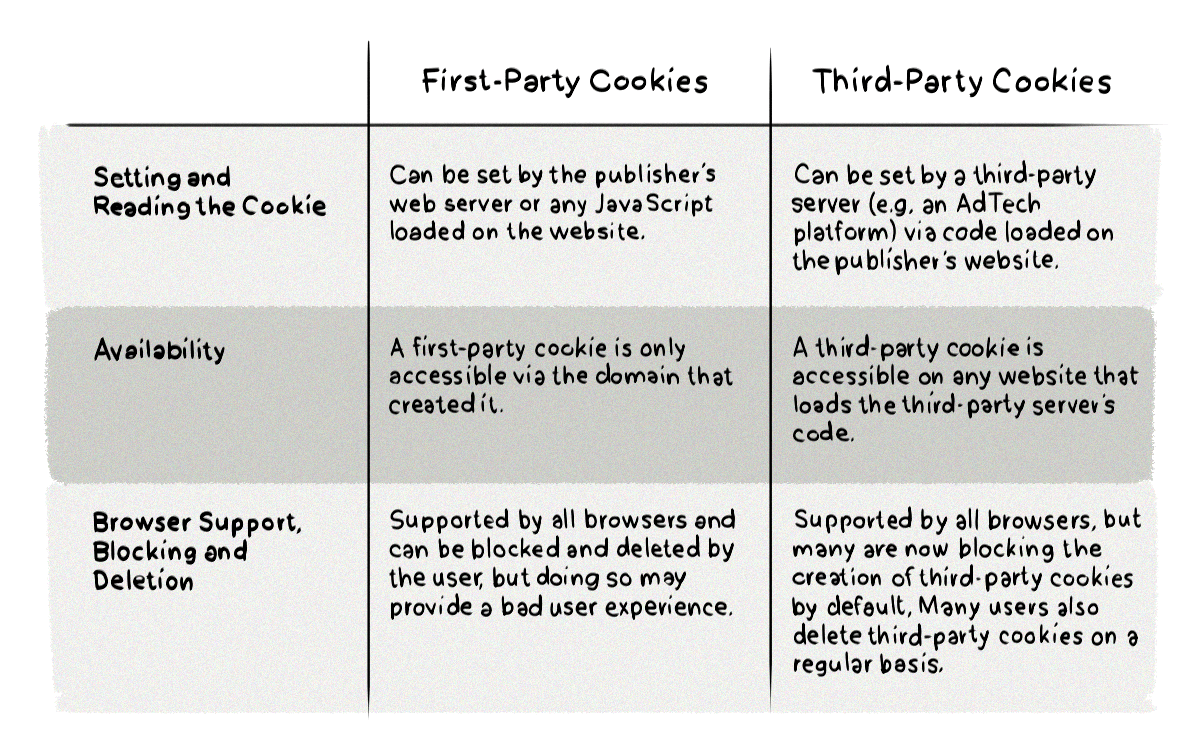
Key Takeaways:
- Muslim Ad Network (MAN) provides more effective targeting for Muslim consumers than broad platforms like Google, utilizing first-party data from exclusive relationships with top Muslim websites to offer deeper insights into audience preferences and behaviors.
- First-party cookies are more reliable and privacy-friendly, allowing businesses to build direct relationships with their audience, offering personalized experiences while staying compliant with evolving privacy regulations.
- Relying solely on third-party cookies is a temporary solution—partnering with MAN ensures your advertising efforts are future-proof, even as privacy changes reshape the digital marketing landscape.
Google has recently overturned its decision to phase out third-party cookies, opting to keep them in the digital advertising landscape for now. It’s not surprising that Google landed on this decision. The repeated delays highlighted major concerns and difficulties, primarily with its cookie-alternative solutions. This decision does not impact Privacy Sandbox. Google says in its blog post, “We’ll continue to make the Privacy Sandbox APIs available and invest in them to further improve privacy and utility.”
This decision buys Google time — a lot of it!
This move is seen as a relief for many businesses that rely on personalized advertising to reach their target audience. For small businesses and mainstream brands targeting Muslim consumers, this change provides an opportunity to continue leveraging targeted ads based on online behavior. However, while third-party cookies remain a valuable tool, relying solely on Google or other major advertising platforms may not be the best long-term strategy.
Muslim Ad Network (MAN) offers an even more efficient way to reach Muslim consumers—one that can withstand future changes in digital privacy regulations.
What Exactly Are Third-Party Cookies?
Third-party cookies track users’ browsing behavior across different websites, helping businesses serve relevant ads. For small businesses, third-party cookies allow you to focus your advertising on a specific audience segment, like those interested in halal products, modest fashion, or Islamic finance. However, with growing concerns over online privacy, third-party cookies are gradually falling out of favor. Google’s initial decision to eliminate them was aimed at addressing these concerns, but this reversal means that businesses can continue using them, at least for now.

Source: What’s the Difference Between First-Party and Third-Party Cookies?
The Limitations of Relying Solely on Google and Third-Party Cookies
While third-party cookies help target audiences effectively, they do have limitations. Relying entirely on third-party data—especially when targeting niche markets like the Muslim consumer base—can result in less personalized experiences. The broader and more generalized the data, the harder it becomes to deeply understand the specific preferences, behaviors, and needs of the Muslim audience.
Moreover, the future of third-party cookies is still uncertain. Google may reintroduce its Privacy Sandbox, or other major platforms could follow suit, further limiting the effectiveness of third-party data. This makes it essential for businesses to look beyond Google and consider other strategies for reaching their audience.
Why First-Party Data Is the Future
As privacy regulations tighten, first-party data—the information that businesses collect directly from their own audiences—becomes more valuable. First-party cookies, unlike third-party cookies, are generated and stored by the websites a user interacts with directly. They allow businesses to track user preferences, behaviors, and interactions on their own platforms. Since this data comes straight from the user, it’s more reliable, personalized, and privacy-compliant.
For your business, first-party data provides an opportunity to gain deeper insights into your audience’s preferences without relying on external data sources. By utilizing first-party cookies, businesses can build long-term relationships with their customers, offering them tailored experiences and more relevant ads, while still respecting privacy concerns.
The Solution: Muslim Ad Network (MAN)
There is currently only one platform that can help you target Muslim audiences efficiently—even with the drastic changes coming up: Muslim Ad Network (MAN). Our platform will be even more vital to your Muslim advertising efforts online as privacy changes continue to reshape the digital marketing landscape.
Here’s why:
- Exclusive Access to Muslim Audiences
MAN has established exclusive relationships with the largest and most influential Muslim websites worldwide. This allows us to collect first-party data from a highly relevant audience—Muslims who are already engaging with content that aligns with their values and needs. Rather than relying on broad data from third-party cookies, MAN can access first-party data directly from these websites, ensuring that your ads reach the right audience. - Targeting Muslim Consumers More Effectively
Unlike Google’s broad advertising platform, MAN focuses specifically on the Muslim audience. We understand the cultural, religious, and lifestyle nuances that shape Muslim consumer behavior, and we use this knowledge to optimize your ad campaigns. Whether you’re offering halal food, modest fashion, Islamic financial services, or any other product that appeals to Muslim consumers, MAN can help you deliver your message in a way that resonates with your audience. - Future-Proof Your Advertising
With Google’s decision on third-party cookies subject to change, relying solely on platforms like Google or Facebook leaves your marketing vulnerable to future disruption. MAN’s focus on first-party data ensures that your ads can continue reaching Muslim consumers effectively, even as privacy regulations evolve. By working with a network that’s built around first-party data collection, your business can stay ahead of the competition and adapt to the future of digital advertising.
Benefits of First-Party Cookies Over Third-Party Cookies
First-party cookies offer several advantages over third-party cookies, particularly for businesses targeting Muslim consumers:
- Better Data Accuracy: First-party cookies collect data directly from your audience, offering more reliable and specific insights compared to the aggregated and generalized data often provided by third-party cookies. This allows you to create more personalized ads tailored to Muslim consumers.
- Privacy Compliance: First-party cookies are far more privacy-friendly, as they don’t rely on tracking users across multiple websites. This makes your advertising efforts more compliant with privacy regulations like GDPR and CCPA, which are increasingly relevant for businesses targeting global audiences, including Muslims.
- Stronger Customer Relationships: With first-party data, you build a direct relationship with your audience, offering them more personalized experiences. For Muslim businesses, this means developing a deeper understanding of the unique needs and preferences of your customers, whether you’re selling halal food, Islamic clothing, or Muslim travel services.
A Boost for Businesses
The ability to use third-party cookies is still good news, but it’s time to think long-term. Businesses should take advantage of Google’s reversal while also preparing for a future where first-party data will play a more central role in advertising. MAN can help you make the most of this transition by providing exclusive access to Muslim audiences and using first-party data to optimize your marketing campaigns.
What Should Muslim Businesses Do Now?
Now that Google’s decision has created a temporary reprieve for third-party cookies, it’s the perfect time to bolster your advertising strategy by partnering with Muslim Ad Network. Here’s what you can do to stay ahead:
- Leverage MAN’s First-Party Data: Start relying more on MAN’s exclusive access to first-party data from top Muslim websites. This will allow you to target your ads more effectively and build stronger relationships with your Muslim audience.
- Refine Your Targeting: Use MAN’s platform to better understand the preferences, behaviors, and needs of Muslim consumers. By focusing on first-party data, you can offer more personalized experiences while staying compliant with evolving privacy regulations.
- Prepare for the Future: While third-party cookies are still in play, the future of online advertising will rely more on first-party data. By partnering with MAN now, you’ll be well-positioned to navigate future changes in the digital marketing landscape.
Conclusion
Google’s decision to keep third-party cookies is a temporary advantage for businesses, but the future of digital advertising lies in first-party data. Whether you’re a small Muslim business or a large mainstream business looking to target a Muslim audience, the best way to ensure continued success is to partner with a platform that truly understands the Muslim audience—Muslim Ad Network. With exclusive access to first-party data from the largest Muslim websites, MAN can help you target Muslim consumers effectively, today and in the future.
Contact MAN today to get a head start and leave your competitors behind!
[button text=”start targeting muslim consumers” color=”success” style=”shade” size=”xxlarge” animate=”blurIn” radius=”10″ depth=”4″ depth_hover=”5″ link=”https://muslimadnetwork.com/get-started/”]